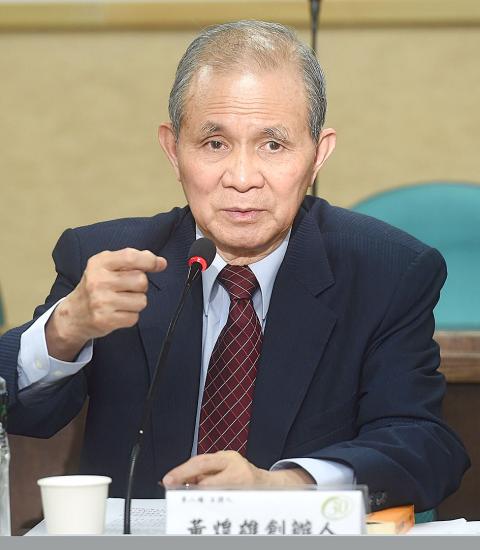While removing authoritarian symbols, the transitional justice promotion committee should aim to avoid exacerbating conflicts between opposing sides, committee chairman nominee Huang Huang-hsiung (黃煌雄) wrote in materials that were on Friday submitted to the legislature by the Executive Yuan for its review of the committee’s nominations.
Taiwanese hold divergent views on authoritarian symbols, Huang said, adding that if the committee could allow society to form a consensus on their removal, it would have succeeded.
When determining the truth and who holds responsibility, the committee should build trust, push for dialogue and allow people to decide which symbols are authoritarian and how to handle them, Huang said.

Photo: Chien Jung-fong, Taipei Times
People often reduce the purpose of the committee to changing road names and the faces on currency, full-time committee member nominee and former Taiwan Association for Truth and Reconciliation chief executive Yeh Hung-ling (葉虹靈) wrote.
The handling of authoritarian symbols should not be the committee’s primary task — it should first uncover historical truths, then gradually describe the different types of authoritarian symbols and facilitate collective reflection to build a foundation for their future handling, she wrote.
Meanwhile, full-time nominee and Academia Sinica ethnologist Peng Jen-yu (彭仁郁) wrote that the committee should work to better understand diverse and conflicting histories so that the symbols could be handled appropriately under a high level of public consensus.
However, full-time nominee and Taiwanese literature academic Yang Tsui (楊翠) said that bronze statues of former presidents Chiang Kai-shek (蔣介石) and Chiang Ching-kuo (蔣經國) should be removed.
Roads and public buildings named after authoritarian rulers should be renamed to show that the people deny the legitimacy of authoritarian rule, part-time nominee and Judicial Reform Foundation member Greg Yo (尤伯祥) wrote.
Nearly all of the items that were left by the German National Socialist Workers’ Party (Nazi party) have been removed, committee vice chairman nominee and Mainland Affairs Council Deputy Minister Chang Tien-chin (張天欽) wrote.
Handling the National Chiang Kai-shek Memorial Hall would be the best way to begin promoting transitional justice, part-time nominee and Academia Sinica Institute of Taiwan History director Hsu Hsueh-chi (許雪姬) wrote, with part-time nominee and National Taiwan University history professor Hua Yih-fen (花亦芬) agreeing that its handling should be the committee’s primary task.
The statue inside the hall could be moved to Taoyuan’s Cihu Memorial Sculpture Garden for preservation, but the hall itself should remain to help Taiwanese understand how the authoritarian ruler was introduced and the effect authoritarianism had on Taiwan before transitional justice, she wrote, adding that it could be turned into an art library or human rights museum.

Taiwan is stepping up plans to create self-sufficient supply chains for combat drones and increase foreign orders from the US to counter China’s numerical superiority, a defense official said on Saturday. Commenting on condition of anonymity, the official said the nation’s armed forces are in agreement with US Admiral Samuel Paparo’s assessment that Taiwan’s military must be prepared to turn the nation’s waters into a “hellscape” for the Chinese People’s Liberation Army (PLA). Paparo, the commander of the US Indo-Pacific Command, reiterated the concept during a Congressional hearing in Washington on Wednesday. He first coined the term in a security conference last

DEFENSE: The National Security Bureau promised to expand communication and intelligence cooperation with global partners and enhance its strategic analytical skills China has not only increased military exercises and “gray zone” tactics against Taiwan this year, but also continues to recruit military personnel for espionage, the National Security Bureau (NSB) said yesterday in a report to the Legislative Yuan. The bureau submitted the report ahead of NSB Director-General Tsai Ming-yen’s (蔡明彥) appearance before the Foreign and National Defense Committee today. Last year, the Chinese People’s Liberation Army (PLA) conducted “Joint Sword-2024A and B” military exercises targeting Taiwan and carried out 40 combat readiness patrols, the bureau said. In addition, Chinese military aircraft entered Taiwan’s airspace 3,070 times last year, up about

A magnitude 4.3 earthquake struck eastern Taiwan's Hualien County at 8:31am today, according to the Central Weather Administration (CWA). The epicenter of the temblor was located in Hualien County, about 70.3 kilometers south southwest of Hualien County Hall, at a depth of 23.2km, according to the administration. There were no immediate reports of damage resulting from the quake. The earthquake's intensity, which gauges the actual effect of a temblor, was highest in Taitung County, where it measured 3 on Taiwan's 7-tier intensity scale. The quake also measured an intensity of 2 in Hualien and Nantou counties, the CWA said.

The Overseas Community Affairs Council (OCAC) yesterday announced a fundraising campaign to support survivors of the magnitude 7.7 earthquake that struck Myanmar on March 28, with two prayer events scheduled in Taipei and Taichung later this week. “While initial rescue operations have concluded [in Myanmar], many survivors are now facing increasingly difficult living conditions,” OCAC Minister Hsu Chia-ching (徐佳青) told a news conference in Taipei. The fundraising campaign, which runs through May 31, is focused on supporting the reconstruction of damaged overseas compatriot schools, assisting students from Myanmar in Taiwan, and providing essential items, such as drinking water, food and medical supplies,